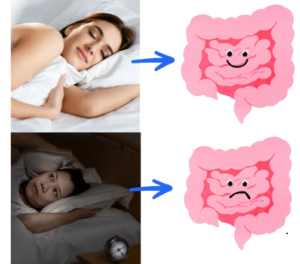Delving Deep into the Crucial Connection Between Quality Sleep and Digestive Health
Sleep serves as much more than just a period of rest; it is a critical process that profoundly impacts our digestive system. Although the intricate relationship between sleep and digestive wellness may not be immediately obvious, it encompasses a multitude of physiological functions that work synergistically. The body’s circadian rhythm, often referred to as the internal body clock, regulates both sleep cycles and digestive processes. This synchronisation is why individuals frequently experience hunger at consistent times each day, demonstrating how our bodies are finely tuned to these natural biological rhythms.
Understanding the Importance of Restorative Sleep for Enhanced Digestive Function 
Sleep is essential for the body’s ability to heal, rejuvenate, and restore itself. The deeper stages of sleep are particularly crucial for these restorative processes. During these significant phases, the organs, tissues, and cells constituting the digestive system not only relax but also engage in vital repair mechanisms. The body prioritises cellular repair and growth during deep sleep, especially concerning the regeneration of cells that line the digestive tract, which continually endure wear and tear due to exposure to food particles and digestive enzymes. This regeneration is vital for maintaining the integrity of the gastrointestinal lining, thereby enhancing the efficiency of digestion and overall digestive health.
Deep sleep also plays a significant role in strengthening the immune system, which is particularly important for the digestive system as it contains its own specialised immune cells activated by beneficial bacteria residing in the gut. These immune cells are essential in protecting the gut and the entire digestive system against harmful microorganisms, ensuring a healthy balance of bacteria in the gut environment. This immune fortification is crucial for preventing infections and maintaining overall digestive health.
Moreover, the organs within the digestive system are instrumental in detoxification, facilitating the removal of waste and harmful substances from the body. Deep sleep significantly enhances this detoxification process by optimising the operational efficiency of the liver and kidneys, allowing these vital organs to function at their peak. This collaborative relationship between sleep and detoxification is a key contributor to overall digestive health and wellness, ensuring that the body is properly cleansed of toxins and able to absorb nutrients effectively.
Investigating the Link Between Gut Motility and Sleep Patterns
A fundamental aspect of digestion involves the efficient movement of food and waste through the digestive tract, which is known as gut motility. This vital process undergoes significant changes during sleep. Both during deep and light sleep, the rate of gut motility decreases considerably. This reduction is a necessary adaptation, allowing the digestive system to conserve energy, which is then redirected towards repairing digestive tissues. This energy conservation enhances the digestive process when we are awake, maximising nutrient absorption and facilitating effective waste elimination.
The migrating motor complex represents a crucial cycle of contractions that occurs during fasting periods, including during sleep. This cycle is essential for gut motility, effectively sweeping away food particles and residue that may remain in the digestive system. This natural cleansing mechanism of the digestive tract reduces the risks of bacterial overgrowth, promoting a balanced gut environment. Notably, the migrating motor complex is most active at night when individuals are fasting and asleep, underscoring the critical role of sleep in safeguarding the health of the digestive system and preventing potential disorders.
As morning approaches, gut motility gradually increases, preparing the digestive system for the efficient processing and digestion of food. This rise in motility can also trigger the first bowel movement of the day, exemplifying the finely tuned relationship between sleep and gut motility. Understanding this connection is essential for optimising digestive health and enhancing overall well-being, ensuring that the body is prepared for the day's nutritional demands.
Investigating Hormonal Interactions Between Sleep and Digestive Function
Ghrelin, often termed the hunger hormone, is a significant regulator of appetite. In contrast, leptin communicates satiety to the brain, helping to prevent overeating. Collectively, these hormones play a pivotal role in appetite regulation; however, their functions can be negatively impacted by insufficient sleep. Understanding their dynamics is crucial for managing eating behaviours and maintaining a healthy digestive system.
Even a single night of inadequate sleep can lead to elevated levels of ghrelin, which may increase appetite and trigger cravings for carbohydrates. This phenomenon is often referred to as feeling ‘hangry’. To complicate matters, leptin levels may decrease following a night of poor sleep, disrupting the body’s signalling that indicates fullness. This creates a challenging scenario where individuals may consume excessive food and make unhealthy dietary choices while struggling to heed their body's cues to stop eating. Although occasional poor sleep may not have severe consequences, chronic insomnia can lead to significant digestive problems, including gut inflammation, liver disorders, gastroesophageal reflux disease, inflammatory bowel disease, and even colorectal cancer, alongside contributing to weight gain.
Understanding the Effects of Sleep Disruption on Digestive Wellness
Disruptions to sleep can lead to a range of digestive issues. Factors such as shift work, particularly night shifts, and experiencing jet lag can significantly disrupt sleep patterns and disturb the body’s internal clock. Additionally, consuming food late at night or having irregular meal times can adversely affect the quality of sleep, further exacerbating digestive issues. The circadian rhythm that regulates sleep is closely connected to natural sunlight, which is essential for maintaining an optimal sleep-wake cycle.
Regrettably, in our technology-driven society, many individuals spend a significant amount of their daytime hours indoors, resulting in diminished exposure to natural light. This shift has led to increased exposure to blue light emitted by electronic devices such as laptops, televisions, and smartphones, which further disrupts the sleep cycle and associated sleep patterns, particularly when this exposure occurs shortly before bedtime.
The cumulative effects of these influences can result in serious digestive issues, including diarrhoea, ulcers, inflammatory bowel disease, or the disruption of the delicate equilibrium between beneficial and pathogenic bacteria in the gut. This imbalance can also compromise the gut lining, complicating matters further regarding digestive health.
Enhancing Microbiome Health Through Quality Sleep Practices
The microbiome encompasses the trillions of microorganisms inhabiting the gut, predominantly consisting of beneficial bacteria known as probiotics, alongside viruses, fungi, and potentially harmful bacteria. These microbial communities are vital not only for overall health but also for digestive wellness. They bolster the immune response and aid in digestion, facilitating the production of essential vitamins, enzymes, hormones, and amino acids. Recent studies have underscored a significant link between the microbiome and sleep, indicating that disrupted sleep or chronic insomnia can negatively affect the balance of these microbes, ultimately impacting both digestive health and overall well-being.
Exploring the Complex Interactions Between Microbiome Health and Sleep Quality
The relationship between sleep and microbiome health is complex and multifaceted. Poor sleep can negatively affect microbiome health, while an imbalanced microbiome can also detrimentally influence sleep quality. To understand this intricate interplay, one study revealed a correlation between a higher abundance of certain bacterial types in the gut and quicker sleep onset, alongside fewer awakenings during the night. Although this article cannot encompass all findings, the key takeaway is that fostering a diverse and abundant population of beneficial bacteria in the gut is essential for achieving optimal sleep, effective digestion, and maintaining overall health.
Assessing the Interrelation Between Stress, Sleep, and Digestive Health
A frequent outcome of stress and anxiety is disrupted sleep. Conversely, these mental health challenges can also negatively impact the physical health and functionality of the digestive system. Such disruptions can lead to altered gut motility and contribute to issues such as indigestion, ulcers, and irritable bowel syndrome. A key factor in this dynamic is the influence of the so-called stress hormone, cortisol, which plays a significant role in the body’s stress response.
Understanding How Cortisol Affects Digestive Processes
When cortisol levels rise, the body reacts by entering a fight-or-flight state. This physiological response diverts blood flow to critical areas such as the heart, brain, lungs, and muscles while reducing circulation to the digestive system. This response prepares the individual to confront danger or escape, a reaction vital for survival in ancient times.
In modern society, however, stressors are often less life-threatening, such as financial worries, work pressures, or inadequate sleep. While the short-term redirection of blood flow may be beneficial in acute situations, chronic stress can have detrimental effects on the digestive system, particularly regarding gut motility. This can manifest in various symptoms, including constipation, diarrhoea, indigestion, gas, and bloating. Therefore, implementing effective stress management strategies is essential for supporting both gut health and ensuring quality sleep.
Ensuring sufficient sleep is crucial for maintaining a healthy digestive system, as the connection between sleep and digestion is deeply intertwined. Prioritising effective sleep hygiene practices is vital for achieving restorative sleep. This includes minimising exposure to blue light from electronic devices, adhering to a consistent sleep schedule, creating a cool, dark sleep environment, avoiding food intake within two hours of bedtime, and ensuring exposure to natural light during the day, particularly in the morning.
References
Understanding Digestive Health and Circadian Rhythms
Exploring Sleep Dysfunction and Digestive Conditions
Examining the Link Between the Gut Microbiome and Sleep
Investigating Stress and Its Effects on the Digestive System
The Article: How Sleep Affects Your Digestive System appeared first on https://janestevensnutrition.com
The Article: Sleep’s Impact on Your Digestive System Explained appeared first on https://janestevens.net
The Article Sleep’s Impact on Digestive Health Explained Was Found On https://limitsofstrategy.com
